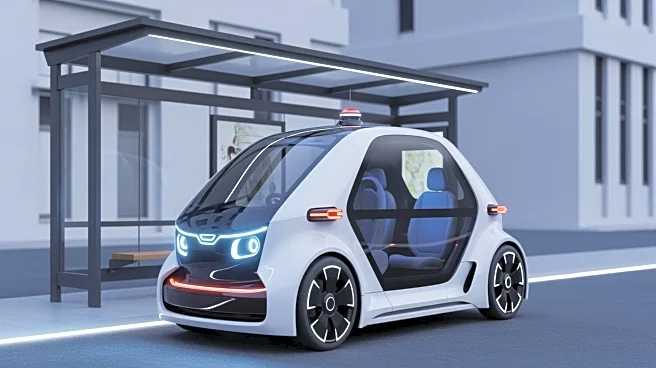What's Happening?
Swiss Post's public transportation division, PostBus, is set to integrate Apollo Go's autonomous robotaxis into its service offerings. Apollo Go, a subsidiary of Baidu Inc., is recognized as a leader in the
robotaxi industry, operating over 1,000 driverless vehicles across 16 cities globally. The new service, named AmiGo, will feature 4-seat fully electric vehicles, known as the RT6 model, which will operate without a steering wheel following successful mapping and safety tests. Testing for these vehicles is scheduled to begin in December, with commercial passenger services anticipated to commence in the first quarter of 2027.
Why It's Important?
The introduction of Apollo Go's robotaxis by PostBus marks a significant advancement in public transportation, potentially setting a precedent for other regions to adopt similar technologies. This move could enhance the efficiency and sustainability of public transport systems, reducing reliance on human drivers and fossil fuels. The deployment of autonomous vehicles may also lead to increased safety and lower operational costs, benefiting both the service provider and passengers. As autonomous technology continues to evolve, it could reshape urban mobility and influence transportation policies worldwide.
What's Next?
PostBus plans to begin testing the RT6 model vehicles in December, focusing on mapping and safety protocols. The successful completion of these tests will pave the way for the commercial launch of the AmiGo service in early 2027. Stakeholders, including government agencies and urban planners, will likely monitor the implementation closely, assessing its impact on traffic patterns and public acceptance. The rollout could prompt further investments in autonomous technology and infrastructure, potentially accelerating the adoption of driverless vehicles in other regions.
Beyond the Headlines
The integration of robotaxis into public transport systems raises ethical and legal considerations, such as data privacy and liability in the event of accidents. Additionally, the shift towards autonomous vehicles may impact employment in the transportation sector, necessitating workforce retraining and adaptation. Long-term, this development could influence cultural perceptions of mobility and autonomy, as societies adjust to new norms in transportation.








